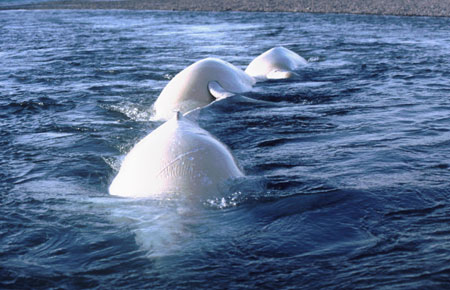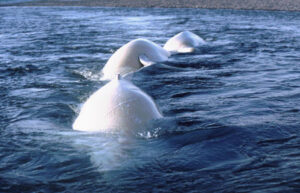
Cook Inlet Beluga Whales Threatened
A coalition of conservation groups, a former whale hunter, and Trustees for Alaska filed a petition on March 3, 1999, asking the federal government to list Cook Inlet’s beluga whales as an endangered species noting that the Cook Inlet beluga whale population has declined to fewer than half its numbers in 1998. The petition also asks the National Marine Fisheries Service (NMFS) to list the Cook Inlet beluga whale on an emergency basis. The emergency listing would confer immediate protection from over-harvesting, pollution, and habitat and food loss under the Endangered Species Act for six months while NMFS develops a final listing decision and identifies steps needed to restore the whale population.
Formerly seen throughout the northern Gulf of Alaska from Cook Inlet to Yakutat Bay, the Cook Inlet beluga whale is now restricted to Cook Inlet. It has become increasingly rare in the lower inlet and continues to decline in the upper inlet. NMFS estimates that the 1994 population of 653 whales dropped to 347 by 1998. This represents an estimated 50% population decline in only 4 years. The Cook Inlet Marine Management Council (CIMMC), a body made up of representatives from the Cook Inlet Treaty Tribes and beluga whale hunters, estimates that a minimum of 65 whales were either killed or struck by hunters in 1995, and up to 147 were killed by hunters in 1996. Valerie Brown, a staff attorney for Trustees for Alaska remains optimistic. “It is not too late to halt the decline of Cook Inlet beluga whales,” she said. “This petition should bring the state, federal government, Alaska Natives, and everyone who cares about Cook Inlet together in a joint effort to turn things around.”
In 1972, the Marine Mammal Protection Act banned everyone except Native Alaskans from hunting for whales. There is no mechanism under that law to regulate the Native subsistence hunt, although hunting restrictions can be enforced if a species is listed as threatened or endangered. Unfortunately, there are hunters who take too many whales and sell the muktuk in the Anchorage area and elsewhere. This commercial hunting, combined with a large number of subsistence hunters has contributed to the decline of Cook Inlet beluga whales. Carl Jack, a former hunter on the CIMMC, recently noted that NMFS is partly to blame for the beluga whale decline because it has allowed commercial whale hunting for many years. Beluga skin and fat has been sold in an Anchorage store for $6 a pound and has also been sold from vehicles parked in various lots in town. “It’s only human nature,” The Anchorage Daily News quoted Jack as saying. “If you put a dollar value on a resource, there will be an incentive to make money.”
Because of unregulated and unreported hunting, both subsistence and commercial, the total number of beluga whales killed every year is not known. The Endangered Species petition asks NMFS to take steps in conjunction with CIMMC to implement whatever regulation of the subsistence hunt is necessary to protect beluga whales. Doug DeMaster, Director of the National Marine Mammal Laboratory, noted that based on the best population estimate, hunters are killing about 20% of the Cook Inlet beluga whales every year. The most a population of belugas can increase through breeding is about 5% per year. In a 1998 report, NMFS concluded that “the current level of human caused mortality is not sustainable.” In fact, the sustainable level of subsistence hunting may be as low as 2 whales killed per year.
Trustees for Alaska is also concerned that other activities in Cook Inlet are having an impact on the declining Cook Inlet beluga whale population. Oil and gas activity, commercial fishing, increasing vessel traffic in Cook Inlet, and pollution from municipal, military and other sources could all pose significant threats to the marine environment Cook Inlet beluga whales depend on. Dan Alex, project coordinator for CIMMC, recently noted that there is scant scientific information about where the whales go when they are not in Cook Inlet, and he suggested that environmental conditions have reduced fish runs on which beluga whales feed.
The state is planning to open up large sections of Cook Inlet for lease on April 21, 1999. Trustees for Alaska, NMFS, and other conservation groups asked the state to withdraw plans to lease areas of Cook Inlet for oil and gas development that are critical habitat for beluga whales. On February 19, the Commissioner of the Alaska Department of Natural Resources denied Trustees for Alaska’s request for reconsideration of this latest, and largest, Cook Inlet lease sale. The Commissioner specifically stated that the state would not be deleting any tracts from the upcoming sale.
The other groups who petitioned with Trustees for Alaska include Alaska Center for the Environment, Alaska Community Action on Toxics, Alaska Wildlife Alliance, Center for Marine Conservation, National Audubon Society and the Southwest Center for Biological Diversity. “Only a listing under the Endangered Species Act will protect Cook Inlet beluga whales and their critical habitat from the threats in Cook Inlet,” said Valerie Brown. “We believe it is short-sighted to blame only the hunters and not address all of the impacts to the vulnerable population of whales.”
Read our other stories on protecting the Cook Inlet beluga whales.



